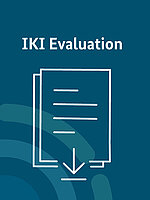Protection of carbon pools and sinks in wetlands and protected areas in Panama
The project provided information and raised awareness on mangrove ecosystems as part of risk management that takes into account climate change - both in reducing the extent of and adapting to the impacts. Mangroves are important and have a multitude of socioeconomic and environmental functions: they serve as carbon stores, protect coastal regions against the effects of climate change and conserve biological diversity. In spite of this, only a few wetlands are effectively protected in Panama. The project supported the management of these protected areas on a total of 13,800 hectares while the national environmental authority provided appropriate training. It also measured the amount of carbon that these ecosystems store.
- Countries
- Panama
- IKI funding
- 2,466,748.94 €
- Duration
- 03/2013 till 02/2018
- Status
- completed
- Implementing organisation
- United Nations Development Programme (UNDP)
- Political Partner
-
- Ministry of Agricultural Development - Panama
- Ministry of Economy and Finance (MEF) - Panama
- Ministry of Housing and Land Zoning (MIVIOT) - Panama
- Implementing Partner
-
- National Environmental Authority (Autoridad Nacional del Ambiente) - Panama
- Water Resources Authority (Autoridad de los recursos acuáticos de Panamá - ARAP) - Panama
State of implementation/results
- Project completed
- With the purpose of strengthening national and local capacities for mangrove conservation, an International Course on Ecosystem-Based Adaptation (EBA) was conducted for 86 technicians from the Ministry of Environment, the Aquatic Resources Authority of Panama and the National Civil Protection System (SINAPROC) through the webinars modality and face-to-face, with a total duration of 160 hours. An additional course on Elaboration of Management Plans for Wetlands with a climate change approach was given to 12 technicians of the Ministry of Environment (4 men and 8 women) for a period of 80 hours. An 8-hour EBA Training was conducted for 25 community leaders (11 men and 14 women), and a Practical Guide for Adapting to Climate Change in the Pacific Coastal Zones of Panama has been produced in two version (printed and digital version).The guide can be downloaded from the website of the project.
- In November, an exchange experiences was held between the Ministries of Environment of Panama and Ecuador to get to know the Socio Manglar Program, which is a participatory conservation mechanism that has been implemented by the Ecuadorian Government and International Conservation Ecuador office with very positive impact.
- In January 2017, MIAMBIENTE presented its experience in the construction of the mangrove carbon-monitoring protocol, at the International Blue Forest Cross Training Workshop held in Panama City. The event brought together 40 scientists from Latin America and the Caribbean.
- The project designed and implemented a Communication Strategy to raise awareness on the importance of mangroves and associated ecosystems, a subpage for the project was designed within the MIAMBIENTE website, and an educational video of 1:33 minutes on "The Importance of mangroves for climate change " with access at the national level. An itinerant exhibition on mangroves and adaptation to climate change was shown in the pilot area starting from May 2017.
- In September, a coastal cleanup in the San Felix and Remedios Districts was performed, with the participation of the MIAMBIENTE Regional Directors, the ARAP Regional Director, private companies, local authorities and the communities. This activity engaged 142 people.
- An Ecoclub was formed called the "Defenders of the El María Mangrove" made up of 43 school-age boys and girls who carried out mangrove conservation educational activities.
- In the pilot area, the project identified 155 hectares of degraded area with potential to initiate a process of restoration of mangrove and associated ecosystems. The signature of an agreement is in process between MIAMBIENTE and the owner of the land to enter into the "Alliance for the Million Hectares Reforestation Initiative" in which a commitment is made for 5 renewable years to monitor the restoration of the land. With participation of community leaders and institutions, reforestation (11,004 seedlings) and restoration activities have been carried out, setting off the process of natural recovery of the area.
Latest Update:
04/2024
Further links
Project relations
Legend:
The link has been copied to the clipboard




